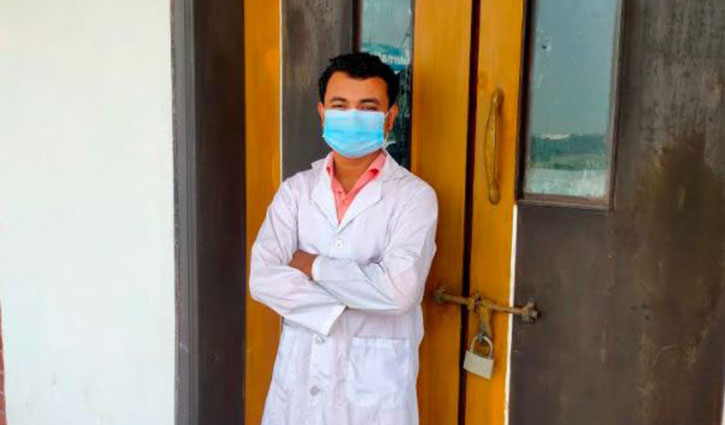How probiotic works for better health! Here are facts…
Shopnil Akash || risingbd.com

Shopnil Akash
The word probiotic means for life. Various germs live inside our body. These are called probiotics. These are bacteria or yeast. All the germs that are inside the body, but they do not harm us. Some germs are our friends. The presence of these germs in our body is a special need for good health. Basically, if we have these germs in the digestive tract, we get various benefits.
Approximately 400 types of germs live inside the body. On average, a human body contains 3 to 4 kg of intestinal germs. That is, it is very easy to guess what a huge number of germs live in our body. Of course, not so many germs live in the body for no reason. They stay with us; because they are needed.
We get scared when we hear the word bacteria. Unknown panic fills our minds. But not all bacteria are bad! There are also some 'friend' bacteria that have caused a stir in medicine.
Let’s get to the real thing, the number and effect of good bacteria in the body can often be reduced due to illness. Then live good bacteria (live bacteria) are introduced through medicine from outside. This good bacterial infection is called probiotic in medical terms. However, probiotics are not just good bacteria, yeast is also a part of probiotics (fungus).
When did the idea of probiotics come from?
In the early 20th century, Russian Nobel Prize-winning scientist Eli Mechnikov made a surprising discovery. He noticed that despite struggling with extreme poverty and bad weather, a group of businessmen from a remote Bulgarian village had been living in good health for a long time. How is that possible! The matter made him think. While observing the daily life of these people, he paid special attention to their eating habits. He found that it was almost obligatory to keep yogurt with as much food as possible.
He then began to put yogurt on his diet for several days. He also got the fruit hand in hand. From the whole test, he concluded that it is possible to establish good health by injecting good bacteria into the intestine. From then on, the concept of modern probiotics began. Since then many studies have come out with the good aspects of probiotics. However, the use of probiotics in medicine began in the nineties of the last century.
How many types of probiotics are there?
Clostridia, Lactobacilli, Enterococci, and E. coli were known as probiotics until the 1970s. Since then the speed of research has increased a lot and many more probiotics have been reported. Notable among these are:
Lactobacillus: There are currently more than 50 types of Lactobacillus known to exist. These are mainly present in the body's digestive system, urinary tract and genital system.
Bifidobacteria: There are about 30 types. These bacteria live in the colon. These bacteria appear in our body within a day of birth.
Is probiotic used only as medicine?
In most cases, probiotics are used as medicine. Probiotics are also often used in food supplements and packaged foods in India. However, the US Food and Drug Administration (FDI) and the European Union have imposed a number of restrictions on probiotic supplements and packaged foods.
How does probiotic work?
In fact, good bacteria can be destroyed by the attack of bad bacteria in the body. Again many times good bacteria can also be killed due to antibiotics used to destroy bad bacteria. There are also many other reasons why the number of good bacteria in the body can be reduced or it can become inactive. This naturally causes various complications in the body. In such cases, probiotics can bring the body's amount of good bacteria back to normal. It also restores the normal balance between good and bad bacteria in the body.
Is probiotic an alternative to the antibiotic?
No, that's not the case at all. There is always a demand for antibiotics to kill the bad bacteria in the body. Similarly, probiotics are used to inject good bacteria into the body instead of the good bacteria that die under the influence of antibiotics. Thus antibiotics and probiotics are used side by side. However, now some diseases are treated with probiotics if the benefits are not found with antibiotics. But again, probiotics are not a substitute for antibiotics.
What are the benefits of probiotics to increase digestion or increase the efficiency of the digestive system?
There are two types of bacteria in our digestive system, good and bad. However, despite the presence of bad bacteria, we do not suffer any physical harm. This is because there is a balance between good and bad bacteria. It can also be seen as an achievement of our digestive system. When in good health, our digestive system is able to flush out all the bad toxins, bacteria, chemicals, and wastes.
However, due to current problems like eating habits, worries, insomnia, the balance between bad and good bacteria of the digestive system is disturbed. This causes various problems in the digestive system. Probiotics work very well in such situations. Also known as infectious diarrhoea, diarrhoea due to taking antibiotics, irritable bowel syndrome (IBS), irritable bowel disease (IBD), general abdominal pain, overactive colitis, ulcerative colitis, helicobacter pylori infection,
What other diseases do probiotics use?
Probiotics are all about gastroenterology. But now research is talking about the benefits of probiotics in many other areas besides gastroenteritis. Immunity will come first. In fact, immunity is the substance that keeps the body healthy by fighting various germs.
Therefore, if a person has low immunity, the risk of developing allergies, autoimmune diseases (such as rheumatoid arthritis, ulcerative colitis, vaginal infections, etc.) and various infections (such as diarrhoea, H. pylori, etc.) is greatly increased. Studies have shown that probiotics also play a role in keeping the immune system healthy.
So many people can now be given probiotics on the question of boosting immunity. If the body's immune system is good, the disease will decrease automatically. Research has also shown that probiotics play a role in resolving diseases such as reproductive tract, lipid profile problems, tooth decay, lung problems and diabetes.
Which foods contain probiotics?
Probiotics are now added to many foods on the market. But when it comes to the general public, the first thing that comes to mind is Tokadai. Yogurt whey, dark chocolate, green olives, cheese, etc. also contain probiotics.
Shopnil Akash is currently studying Pharmacy at the Daffodil International University
DIU/Mahfuz



































